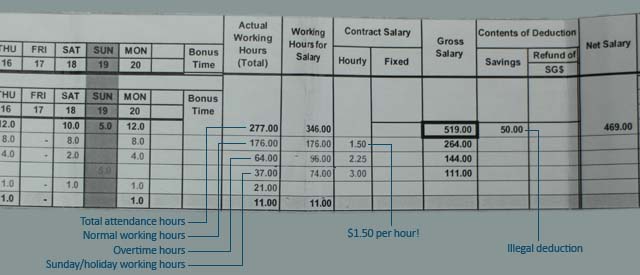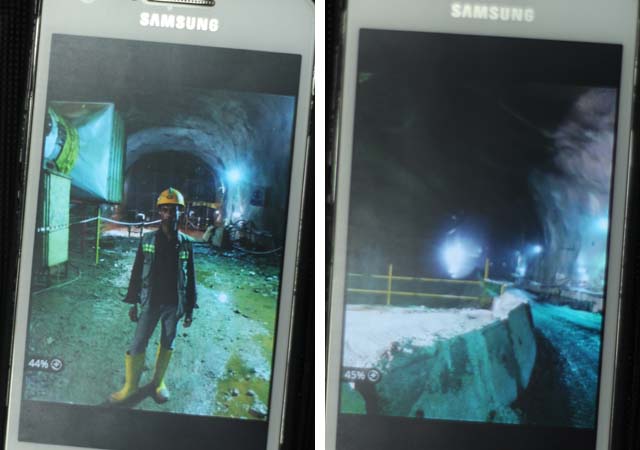
Hossain Iqbel’s IPA states a basic monthly salary of $800, but for a year, he’s been paid a basic of only $1.50 an hour (equivalent to $286 a month). The ‘IPA’ is the In-principle Approval for a Work Permit, a letter issued by the Ministry of Manpower (MOM) to employer and employee prior to the worker’s arrival in Singapore. The salary stated in the IPA is the salary that the employer declares (to MOM) that he is offering the prospective worker.
By-laws state that:
The employer shall not . . . reduce the foreign employee’s basic monthly salary or fixed monthly allowances to an amount less than that declared as such in the work pass application submitted to the Controller in relation to the foreign employee
— Paragraph 6A(1)(a) of Part IV of Fourth Schedule of Employment of Foreign Manpower (Work Passes) Regulations 2012, page 37.
The interesting thing about Iqbel’s case is that the employer, Woolim Plant Engineering and Construction Co Ltd (Singapore branch), has provided him and his fellow workers with monthly time sheets and detailed payslips. These are exactly what TWC2 has asked MOM to make mandatory (though MOM has not yet done so). It is from the payslip that we can see Iqbel being paid at a ridiculously low rate of $1.50 per hour. This should make it an open-and-shut case of underpayment, thus saving MOM officers’ time in dealing with the matter.
Here is the relevant portion of Iqbel’s IPA:

Here is part of Iqbel’s payslip for April-May 2013 with TWC2’s notations in blue. The company’s salary ‘month’ is the period from the 21st of one calendar month to the 20th of the following month:

Iqbel’s correct hourly rate, for normal working hours, is $4.196, based on a formula provided by law (see box at right). Instead, the company uses a rate of $1.50, which is less than half the correct rate. Consequently, the overtime rate and holiday rate are also wrong, since these rates are multiples of the base rate.
 Furthermore, you can spot two other problems from the above payslip:
Furthermore, you can spot two other problems from the above payslip:
(1) On Saturdays there should only be four normal working hours, not eight as seen in the payslip, since Singapore law stipulates a 44-hour week, which implies a five-and-a-half day working week; his overtime hours is under-calculated as a result.
(2) There is an illegal deduction of $50 for “savings”.
Actually, there are other problems not visible in the portion of the payslip imaged above, but for the purpose of this article, they don’t all need to be enumerated.
![]()
Fifteen men in all
Iqbel and two co-workers first came to our office on Monday 16 December, meeting with social worker Nor Karno. “How did you come to know about us?” asked Karno.
They said they got our address and phone number from another worker (not from the same company) staying in the same dormitory. However, they had no idea how this other worker knew about us. Our guess is that this mystery worker probably received an information leaflet from us during one of our recent outreach events in Boon Lay, Sembawang or Yishun. It would be recent, because these three guys were given our new address. We moved in only three months ago.
They tell us there are a total of fifteen men with similar salary problems.
On 20 December, Iqbel came again, this time with five others, for a more detailed consultation. Where are the other nine, we ask?
“Their bus card not enough money,” the group tells us. “They cannot come.” That’s what happens when workers are severely underpaid for months; they don’t even have enough mobility to seek help.
We sat the six down and explained how to calculate their salaries and overtime pay. They then spent the next few hours doing so for the months they’ve been working here. It appears that all the men started work in December 2012, and all had IPAs stating basic salaries of $800 per month. However, some of them had not retained copies of their time sheets, which may mean complications in their claims.

Iqbel (centre) and five others from Woolim calculating their salaries owed, 20 Dec 2013
To assist the remaining nine workers, Karno and your writer trekked up to Kranji MRT station to top up their EZ-Link cards. Their dormitory is about 15 minutes’ walk from the station. We called them in advance and asked them to meet us at the station. With their cards topped up, they should be able to come see us next week.
Here’s Karno at Kranji station, recording their top-ups:

One of the Woolim men signing on a clipboard to acknowledge receiving an EZ-Link top-up
![]()
132 metres underground
The men were working seven-day weeks. More strikingly, their time sheets indicated that they showed up at work at between 5:30 and 6am in the morning, though paid work didn’t start till 8am.
“What about breakfast?” your writer asks them.

One of the men’s timesheet showing their long hours at site
“We collect breakfast and lunch packet from dorm in the morning,” the men explain, “and eat breakfast at site.” Every day, Sundays included.
“What kind of work were you guys doing?”
“We work [on] Jurong Island,” says Harunur Rashid. “132 metres inside ground.”
Apparently, they were part of a project creating a huge cavern. “Inside have road eleven kilometres long. . . . Big area, have 400 men working there.” It’s also very hot and dusty, with blasting going on “four, five, six times one day.” They have to wear helmets and goggles, but “boss respirator mask no give,” says the men. “Only have 3M mask” — which may not be good enough. “Sometimes, oxygen short.”
Their job however is not to do the blasting. Instead, they do “pipe-fitting, welding, cutting,” says Iqbel and Harunur. Some of the pipes are huge, described by the men to be 46 inches or 54 inches in diameter.
One of them has photos of the underground site:


Visible at the top left of the third photo is one of the 46-inch pipes they installed inside the rock tunnel.
![]()
Complaining since January 2013
Says Iqbel: “From first month, I tell boss my salary no correct. My permit make $800, how you pay one point half dollar per hour, I tell him.” The employer’s response, Iqbel says, was to postpone resolution. “Boss say, ‘OK wait, you continue work, next month I solve problem.'”
Harunur too protested to his employer. “I every month talk about my salary,” he tells TWC2. “I much angry. So February my salary up to $1.75.” Still, that wasn’t correct, so he continued to protest. “I every month angry.”
But having paid thousands of dollars to employment agents to get to Singapore, the men couldn’t just walk off their jobs. Getting a few hundred dollars each month in the interim was better than getting none at all. However, as December 2013 approached — the end of their one-year work permit — they made one last attempt to get their correct salaries but, according to the men, they were rebuffed. Reports Iqbel and Harunur, “In November, we talking boss again: What about salary? Boss say, ‘You go back [to Bangladesh]. I cannot solve, I no settle.'”
With nothing more to lose, it came time to lodge a formal complaint at MOM. The first two men went there on 2 December 2013; others followed soon after.
The men have been given appointments for a meeting at MOM in early January. “Well, you have to get your calculations done by then,” Karno advises them. The first calculations indicate that each man may be owed as much as $9,000 to $10,000.
But will MOM help them get back the full amounts owed, or will officials merely go no further than one quarter or one half of the way as happened in previous such cases? See Part 2.
